B2B…is What Exactly? Understanding B2B Companies
by Cydney Hatch • July 2, 2018
B2B… is what exactly?
No, it’s not another 2000’s R&B group, we already had B2K and those types of B2’s should stay in the 2000s along with oversized t-shirts, frosted lip glosses, Reading Rainbow and Sugar Ray.

B2B is not an ab physiqued 2000’s boy band group, it’s a flourishing business-to-business (what “B2B” stands for) model for selling products and services.
B2B companies are completely different than consumer sales and although they do not get as much buzz as the latest consumer start-ups, B2B companies have several distinct advantages. If your product is valuable to businesses, they will pay for it.
If this is a new concept for you, let’s take a look at everything you need to know about B2B companies and how they compare to other business models you are familiar with.
What is a B2B Company?
Business-to-business (B2B) simply means business-to-business, which is a business model that focuses on selling products and services to other companies. Think of it as a supportive company that that through their products and services helps companies succeed or boost their internal efforts.
So if you sell office furniture, accounting program software or office paper like Dunder Mifflin Paper Company, you are considered a B2B company.

Now, you might be thinking that is a pretty niche business model, because how much can you really “sell” to other businesses? But, you would be surprised about how much B2B covers. B2B is more common than you think in our modern world. Services like Dropbox, General Electric, Xerox and WeWork are great examples of modern day application of B2B companies.
So, if a B2B company is going to be successful, they must develop strong customer service and loyalty and create meaningful change in their customer’s business that significantly improves their performance. But who are the business customers of B2B companies?
Who is B2B’s Target Audience?
Unlike business-to-consumer (B2C) businesses whose customers are the people who purchase a product or service, B2B customers are harder to define. It is obvious their target audience is other businesses but depending on the types of businesses they are targeting, their size, decision-makers or a “buying center” will vary.
Instead of marketing to individuals who can immediately buy a product like a typical B2C ecommerce business, B2B businesses have to strategically reach out to other businesses.
A business customer’s purchasing decision must be in the best interest of everyone involved in the business, so your marketing plans as a B2B business must be precise, clear and engaging.

Now that we covered the basics of a B2B company, let’s take a look at some of the basic marketing steps you need to consider when you are creating a B2B company. From there, we will then look at successful examples of B2B companies and how they successfully managed the basics for their business success!
B2B Marketing Basics: Let’s Make a Plan
So, we have seen some of the master B2B companies and we have learned that they succeed mostly focusing on business painpoints for their workflow but what should a B2B marketing plan look like?
As complicated as B2B marketing can be, it’s easy to get caught up in different strategies, channels, campaigns, and tactics. Having a plan is the best way to keep things secure and structured (remember, we gotta sell the board on the “buying center”—not just an individual—so structure is needed).
Below, let’s look at some of the fundamental “basics” a successful B2B company should have.
Define your Audience
Like any marketing plan, you need to know at minimum who you are wanting to target. If you don’t have a precise picture of who your target customer and audience is, you are wasting your time. What every B2B marketing strategy has in common is targets that can be defined and refined.
It’s impossible to market to everyone at once, so you need to concentrate on your core audience. Anyone else should be secondary to that small core group of people.
Focus your efforts on an individual customer segment. This customer segment will be your image of the perfect customer. As a B2B company, you will need to have a strong sense of who and how your products/services will help those buyers.
Create Context for Audience
Once you discover your target market, you need to create content that resonates with them. Without understanding what your customers care about and their purchasing path, you’re going to struggle to present, write and create content that is intended for the businesses you are targeting.
You need to know how your buyers like to buy and what they respond to.
Think about and focus on finding their motivations, pain points, and buying behaviors. This will put you in the best possible position to sway them to hiring your services and buying your products.
Quality Content
Simply put, you need to create content marketing that helps your audience learn and work smarter.
When your target market is not aware or doesn’t have top-of-mind awareness of your product/service or the benefit it offers, then the first objective is to create awareness. The key element here is to create educational content based on a set of keyword phrases and topics that potential prospects are already searching for online.
Awareness can be built through:
- Blog posts, articles or infographics published on your site
- Featured articles on third party platforms
- Testimonials from happy customers
- Reviews on sites like Facebook, Google, and Yelp
Once awareness is established, you will need to educate your audience about your unique approach to their problems. They will also want to learn more about your story and business organization.

If you do not give them something that sets you apart, you will just be slapping them with a price not value to their company—avoid this at all costs!
Optimization
Businesses evolve and your marketing will need to as well! Since your clientele are evolving creatures due to the world around them, you will need to keep up with the times and tweak your businesses to best serve the businesses of the world!
Even if you find the “sweet spot” of business success, what works today may not work a year or six months from now.
Also, it’s good to know that when your business grows, your needs are going to change. Any strategy you come up with should have the capacity for scaling. Effective scaling will ensure that you can continue to increase revenues while meeting the needs of your target market.
Social Media
Did you know that 57% of inbound marketers have obtained leads from LinkedIn, 52% from Facebook and 44% from Twitter? Social media will help your B2B business!
I think that a lot of B2B businesses get hung up on social media because the old school ways of meetings, calls and traditional tactics seem to make sense to their business model—but that is a myth!
You need to integrate social into your strategy for even better results.
If you’ve been shying away from Twitter, Facebook and Instagram because you think it won’t work for companies that serve other businesses, you’re missing out on a huge opportunity.
Consider the following as you put together your social media strategy:
- Who is your target audience?
- What is your brand personality and how will we set outselves apart?
- What social platforms will you use?
- What type of content will you be publishing?
- What are your goals?
- Which social media metrics will you be using to measure your efforts?
- How are your competitors using social media? How can we do it better?
Answering all of these questions will allow you to effectively execute a successful social media plan and will also allow you to adjust your strategy when you need to.
The below B2B companies rocked the above marketing basics as they successfully targeted precise audiences, created meaningful and engaging content, optimized their efforts for business and rocked social media with content made to stick out!
B2B Companies That Are Killing It and Why
These are some of the thought leaders and golden examples of B2B businesses!
WeWork
WeWork was founded in 2010 with a mission to build shared office spaces and build community. If you browse through their website and their photos you see they created an experience for businesses and entrepreneurs: They created the ultimate office space.
WeWork encourages a new spirit of the work space that you need to “make a life, not just a living” (what better emotional/personal connection can you make with potential customers?).
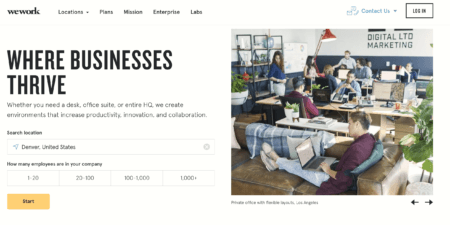
WeWork is an incredible B2B company example because it has massive office spaces and continually evolves the research behind office spaces and how thousands of different businesses use it. By doing this, they position themselves as the company with the most valuable firsthand knowledge about how jobs best get done and what individuals need from the modern day work space.

WeWork looks to the future of its individual and small business consumers, they evolve with their market so their customers feel they are most productive and they rethink their basic needs to get the job done. It can be a cost effective way to do business and changes the way we think about going to the office. They market themselves well and it’s a ever evolving business to inspire people to work in their preferred way.
If you are a small business, they really appeal to your need for cost effectiveness, flexibility and style.
Slack
Slack is where work flows. It’s where the people you need, the information you share and the tools you use come together to get things done. Slack provides a communicating platform where your business team can come together to collaborate effectively!
Through effective communication channels that can be organized by projects, topics or teams, a messaging application has never been more helpful to a business. If you are a company where you have a lot of moving pieces, remote individuals and a lot to organize, Slack makes sharing content and a work space digitally a quality experience.
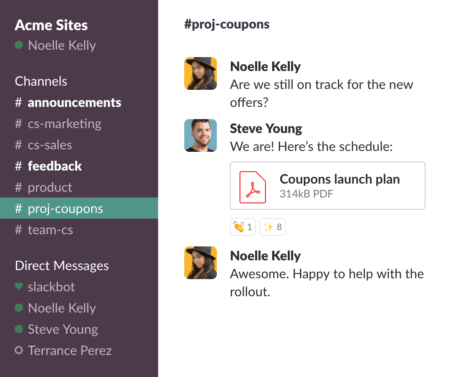
Hundreds of people are contributing across the world with many stakeholders who need to stay informed. The ease of communication that Slack provides helps support the teams that are delivering value at this pace and scale.
This is why Slack is an amazing B2B company example, it scales communication for businesses. So, if you need a communication channel that can help your business team members thrive on projects and sharing information effectively, efficiently and quickly, Slack can help you out!
MailChimp
Mailchimp is the world’s largest marketing automation platform. It’s like a second brain that helps millions of customers—from small ecommerce shops to big online retailers—find their audience, engage with their customers and build their brand.
Mailchimp helps business send better mail and marketing campaigns via email! This speaks to businesses who struggle to afford top designers, let alone a design team to create quality content.
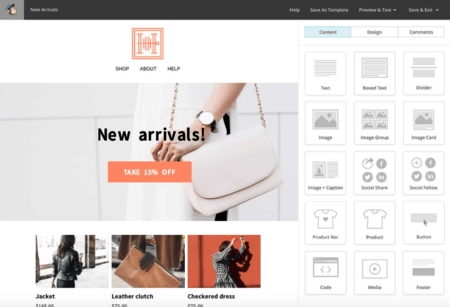
Whether you need to sell your products, share some big news, or tell a story, Mailchimp’s campaign builder makes it easy to create an email marketing campaign that best suits business messages.
MailChimp gives you the marketing tools to be yourself on a bigger stage, so if you are a business that is looking to expand its email campaigns and general marketing efforts, Mailchimp can help you get the word out in a snazzy way.
Buffer
Do you ever wonder how Beyonce does everything that she does? Well, sadly, she has 24 hours in a day just like you do. What she does better than the rest of us is find tools to help her accomplish more. You can do the same by using time-saving tools like Buffer!

Buffer is a software application designed to manage accounts on social media networks so users can schedule posts to Twitter, Facebook, Instagram, and Linkedin.
Buffer saves you time, sanity and helps you stay on top of being “active on social media” as a business (which essentially means posting on social media at least once a day). As a business, you understand time is money, so even little tedious projects like posting to social media can hurt bottom lines.
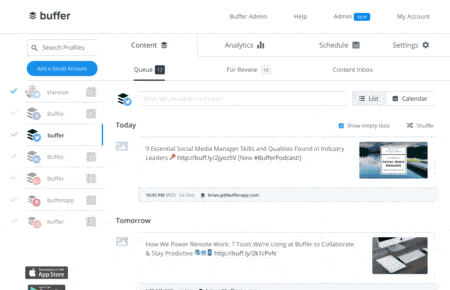
No more wasting time, no more logging into multiple social accounts so Buffer helps the pain point for time efficiency. Buffer speaks to the businesses who have a lot to say across a lot of platforms, but might not have the time nor the man power to communicate consistently across a wide array of social media platforms.
SalesForce
Salesforce is a content powerhouse, delivering a vast quantity of material across its many marketing channels. It is a doozy of a program to learn as a business, but it is a centralized place to organize everything about your business.
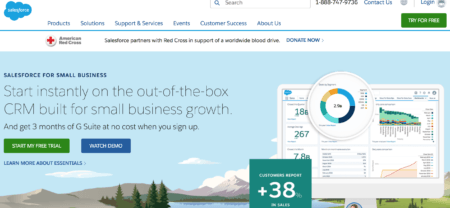
Their cloud-based applications for sales, service, marketing, and more don’t require IT experts to set up or manage—simply log in and start connecting to customers in a whole new way.
More than 150,000 companies are blazing trails to success with Salesforce’s services. So, if you are a business looking for a centralized place to log in your client’s information, to compile accounting “excels” or to manage your marketing and client communication logs Salesforce helps businesses stay organized and moving forward!
LinkedIn continues to set itself apart in the content marketing world by being equal parts professional social media network and thought leadership platform.
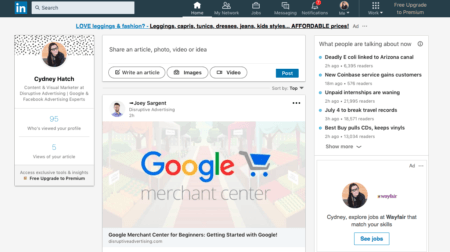
The company has cultivated a reputation as the place to go for all sorts of smart insight into the business world. It shares content from “how to’s, business articles and news to even job openings!
The wide availability of content options that LinkedIn advanced has helped the company hold its position as one of the best B2B brands that well informs its businesses who use it.
So if you are a business that struggles socially, or wants to be informed on their market’s issues and topics LinkedIn offers them strong content to be “in the know” and get to know others in their fields digitally!
VidYard
Video software company VidYard knows a thing or two about engaging audiences with creative video. Their site is full of examples of interactive content that is not only entertaining, but incredibly helpful.
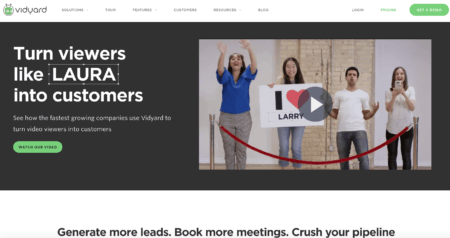
You’ll notice that much of their content also includes a call-to-action asking viewers to fill out a form—turning this interactive content into a series of lead-generation machines.
This type of service for a business can collect customer’s information without seeming nagging or intrusive. Video content is an effective marketing strategy but for many businesses creativity is a pain point VidYard can help with!
PewResearch Center
Pew Research Center calls themselves a “nonpartisan fact tank.” We know them, of course, as one of the foremost research organizations in the US.
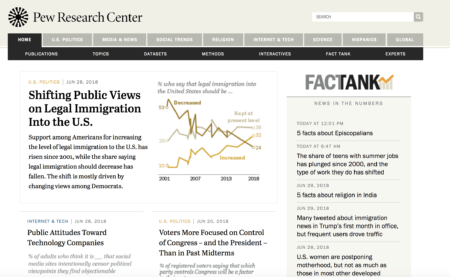
While most research reports are pretty cut-and-dry, Pew is constantly collecting data through surveys and questionnaires that customers can fill out.
Now, you might be wondering why I am listing this as an effective B2B company, but data is really concrete information you can use to create your marketing strategy. Informing yourself as a business owner on the world and the customers you are trying to target will only help you zero in on their feelings, behaviors and how you can manipulate that for your marketing.
Similarities? I think so!
What do these all of these B2B companies have in common?
They are all addressing pain points businesses have and they have created a B2B business solution to solve and help businesses with those pain points! Like Disruptive Advertising, they are here to help businesses succeed and do what they love and what they do best: their passions!

They are all successful because they help businesses progress by making their lives more efficient, valuable and quality. So, if you are wanting to start your own B2B business or you are struggling refining your business mission, think about how you are helping other businesses progress!
B2B, Now You Know
Well, you now know everything you need to know about the basics on B2B companies and what makes them successful.
To be honest, there is no one size fits all strategy when it comes to B2B marketing, however, it is essential to stay on top of trends and make a powerful brand presence, in order to increase conversions and ROI and step up your game in 2018.
If you would like some help in your B2B marketing strategies or to learn more about B2B we are happy to help! Contact me here and let’s talk!
What do you love about B2B companies? What are some of the elements you think make a successful B2B business?





